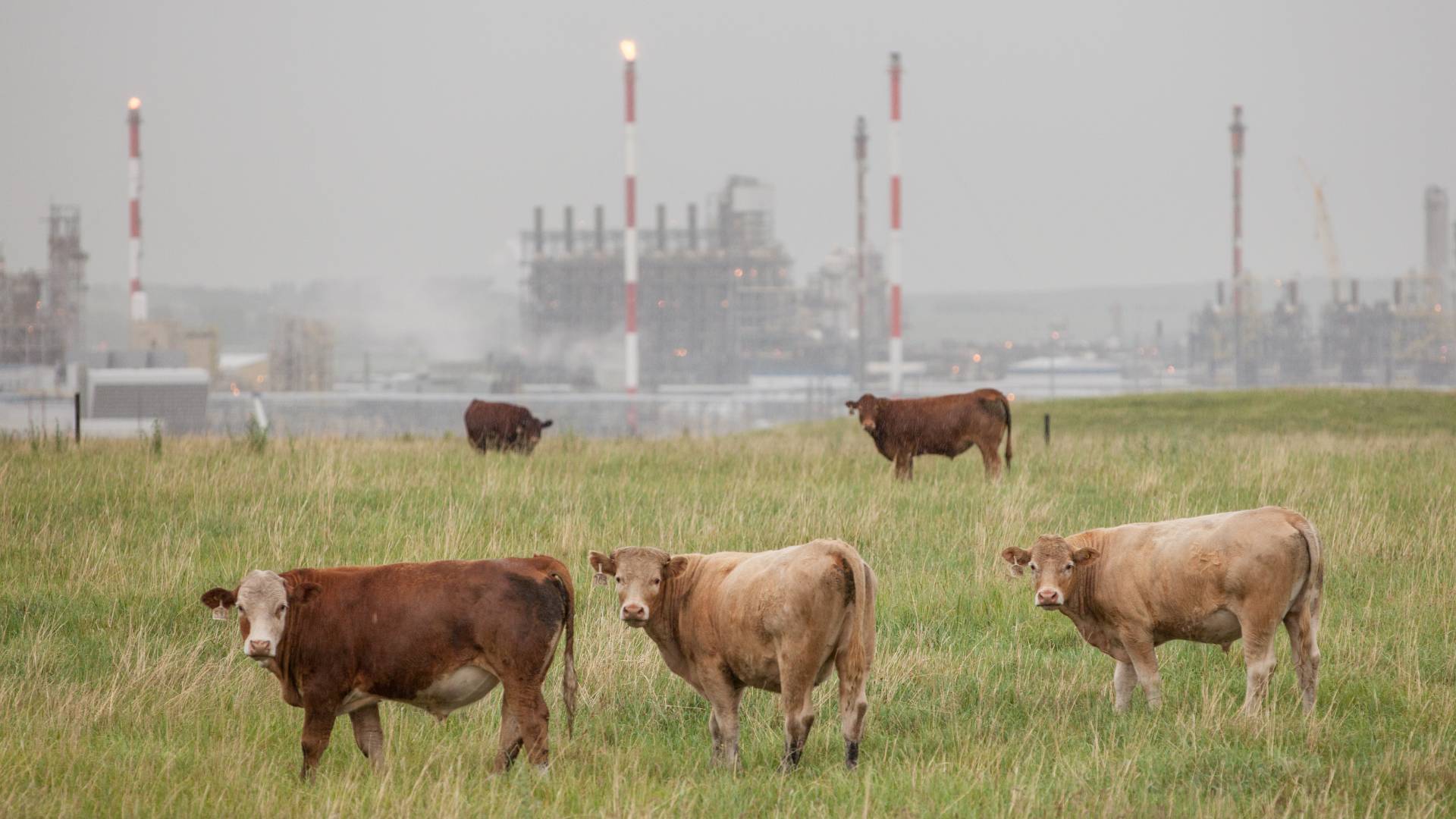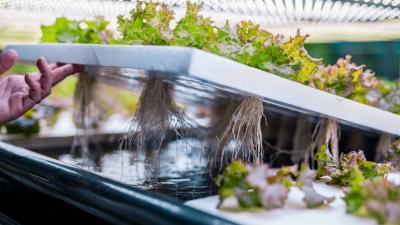Why White House Must Call for Cutting U.S. Meat Production to Tackle Climate Crisis

The Physicians Committee recently petitioned the White House to update its executive order titled “Tackling the Climate Crisis at Home and Abroad” to recommend policy changes that could help alleviate the climate crisis by cutting animal agriculture and promoting a plant-based diet. Susan Levin, MS, RD, CSSD, director of nutrition education for the Physicians Committee, answers questions about the petition.
Why did the Physicians Committee file the petition?
For years, the Physicians Committee has urged the federal government to shift subsidies for meat and dairy products to fruits and vegetables, promote plant-based diets in the Dietary Guidelines, and include more plant-based options in the National School Lunch Program. These steps would help the nation fight obesity, heart disease, diabetes, and other diet-related chronic diseases.
Evidence shows that these same steps would also help fight the global climate crisis, so it seemed like a glaring omission for the executive order to leave out policy changes that could help alleviate the climate crisis by cutting animal agriculture and promoting a plant-based diet.
Why are the actions that the petition requests directed to the Secretary of Agriculture?
The White House's executive order establishes a National Climate Task Force, and the Secretary of Agriculture is one of its members. The U.S. Department of Agriculture is the federal agency where agriculture, nutrition programs, and the environment intersect. The USDA was created to support the nation’s agricultural interests. It was later asked to create nutrition guidance. The two tasks do not coexist well. How can it inform the public of the dangers of meat and dairy—to both humans and the climate—while also trying to get the public to buy more meat and dairy?
What does the evidence show about the benefits of a plant-based diet for the environment and human health?
A study published in The Lancet in 2019 concluded that a dietary shift toward plant foods and away from animal products is vital for promoting human health and the health of our planet. The researchers found that food production is responsible for up to 30% of total greenhouse gas emissions, with animal products accounting for the vast majority—about three-quarters—of these effects. The report states that projections for the future show that “vegan and vegetarian diets were associated with the greatest reductions in greenhouse-gas emissions.”
Another study found that a global shift to a plant-based diet could reduce mortality and greenhouse gases caused by food production by 10% and 70%, respectively, by 2050. A global dietary shift would save an estimated 79 million human lives and avoid 5.1 million deaths per year. Estimates for a completely vegan diet project closer to 129 million lives saved and 8.1 million deaths avoided. These projections also saw trillions of dollars saved in health care costs by 2050.
The Physicians Committee has free continuing medical education courses available to health care professionals and anyone else who wants to learn more: Eating as if the World Depends On It, Eating for the Planet: The Environmental Impacts of Dietary Choices, and Food, Health, and Environment: A Potential Pathway to a Double Win.
What can other nations do?
Follow the guidance of the United Nations and the World Health Organization. A report from the United Nations Environment Programme says that “animal products, both meat and dairy, in general require more resources and cause higher emissions than plant-based alternatives.” The World Health Organization says, “Studies show that cutting back on red meat production reduces the nitrous oxide released into the atmosphere by fertilizers and animal manure. Nitrous oxide is the third most important man-made greenhouse gas and the most important anthropogenic contributor to stratospheric ozone destruction. Reducing livestock herds would also reduce emissions of methane, which is the second largest contributor to global warming after carbon dioxide.”
The White House executive order recommends cutting fossil fuel subsidies. Why is cutting subsidies for meat and dairy products also important?
The world’s five biggest meat and dairy producers emit more combined greenhouse gases than ExxonMobil, Shell, or BP, the top three oil production companies, according to a report by GRAIN and the Institute for Agriculture and Trade Policy (IATP). Researchers tracked greenhouse gas emissions for 35 of the largest producers of beef, pork, poultry, and dairy. The researchers found that the companies’ emissions are reaching dangerous levels due to unregulated growth and governmental subsidies to ensure inexpensive production costs and supplies such as animal grain. The report calls for a reduction of greenhouse gases by 38 billion tons by 2050. The report states that many of the largest meat and dairy producers do not report emissions, and many are increasing production with no efforts in place to reduce their emissions. If production remains unregulated, by 2050, meat and dairy farms will account for 80% of the budgeted greenhouse gas emissions.
When it comes to health, the evidence for cutting subsidies for meat and dairy is also clear. The federal government spends about $38 billion a year subsidizing meat and dairy products and less than 1% of that amount on fruits and vegetables, according to one estimate.
A study conducted by researchers from the Centers for Disease Control and Prevention and Emory University found that “current federal agricultural subsidies focus on financing production of food commodities, a large portion of which are converted into high-fat meat and dairy products” and other items that increase the risk for cardiometabolic risks in American adults.
The researchers followed participants from the National Health and Nutrition Examination Survey and measured the percentage of calories consumed from subsidized foods, body weight, blood pressure, inflammation measures, and cholesterol levels. Those who consumed the most subsidized foods, including high-fat meat and dairy products, were 41% and 21% more likely to be overweight and have elevated blood sugars, respectively.
Are there any crops that are particularly beneficial for the environment?
Beans! One study found that swapping beef for beans would help the United States reach targeted greenhouse gas emission reductions. Researchers compared simulated net emissions of legume production, subtracted those from average beef production rates, and used U.S. reduction goals for 2020 as a reference. Based on the results, legume substitution could account for 46-74% of the required reductions. Other research has shown that policies that encourage a diet that includes legumes, such as chickpeas, lentils, and peas, would benefit human and environmental health.
Why should the Dietary Guidelines for Americans discuss the environment and climate change?
A recent analysis looked at the dietary guidelines of 85 countries, including the United States, and found that they could be both healthier and more sustainable. The authors note that the Dietary Guidelines for Americans were incompatible with climate change and nitrogen targets.
The study concluded that, “Providing clearer advice on limiting in most contexts the consumption of animal source foods, in particular beef and dairy, was found to have the greatest potential for increasing the environmental sustainability of dietary guidelines, whereas increasing the intake of whole grains, fruits and vegetables, nuts and seeds, and legumes, reducing the intake of red and processed meat, and highlighting the importance of attaining balanced energy intake and weight levels were associated with most of the additional health benefits.”
In 2015, the Dietary Guidelines Advisory Committee recommended a shift away from animal products toward plant-based diets for sustainability. The committee stated that “a dietary pattern that is higher in plant-based foods, such as vegetables, fruits, whole grains, legumes, nuts, and seeds, and lower in animal-based foods is more health promoting and is associated with lesser environmental impact (GHG emissions and energy, land, and water use) than is the current average U.S. diet.” The 2015-2020 Dietary Guidelines for Americans did not follow the advice of the committee, and sustainability was not included in the 2020-2025 Dietary Guidelines for Americans.
Vice President Kamala Harris has even said that federal food guidelines should recommend reducing red meat to fight climate change.
The petition also asks for plant-based school lunches in the National School Lunch Program. Are there steps food service workers can take now to incorporate more plant-based school lunches?
A report from Friends of Earth found that when Oakland Unified School District in California replaced meat, poultry, and cheese with plant-based foods, there was a 14% reduction in the district’s carbon footprint and 42 million gallons of water were saved. The Physicians Committee co-hosted a webinar with Friends of the Earth called Scaling Up Healthy, Climate-Friendly School Food. There are also resources at HealthySchoolLunches.org.







